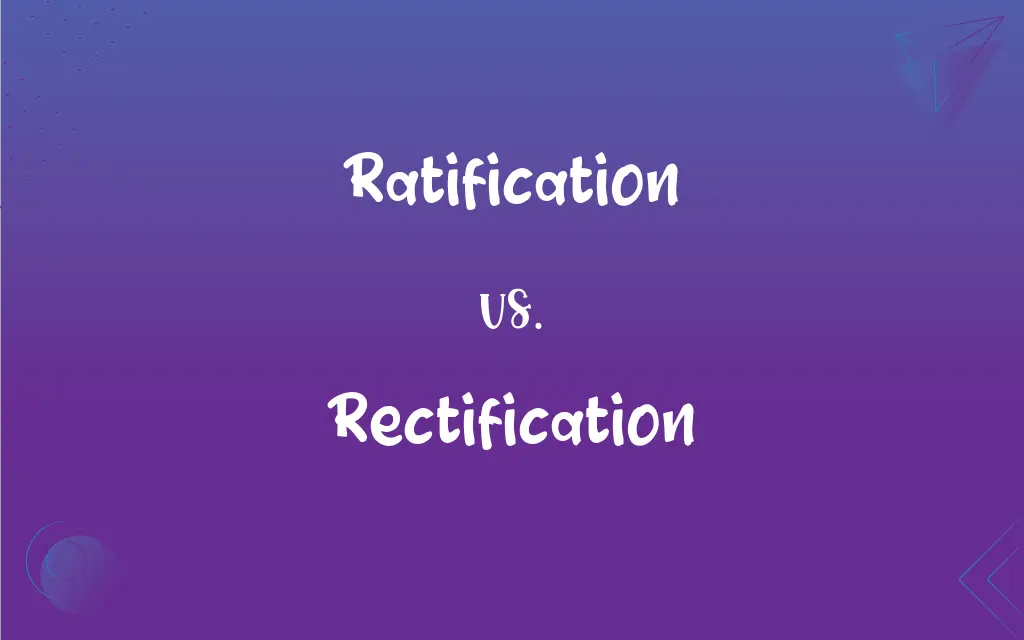Ratification vs. Rectification: What's the Difference?
Edited by Aimie Carlson || By Janet White || Published on July 17, 2024
Ratification is the official approval of an agreement or treaty, whereas rectification involves correcting errors or inaccuracies.

Key Differences
Ratification is a formal approval process, typically used in the context of agreements, treaties, or constitutions, signifying consent and validation. Rectification, on the other hand, refers to the act of making something right, correcting mistakes, or adjusting something to a correct or desired state.
Ratification is about endorsing a decision or document that has already been provisionally agreed upon, making it officially valid and binding. Rectification is often used in legal, technical, or personal contexts where errors have been identified and need to be corrected.
The essence of ratification lies in its ability to give formal consent or sanction to something, thereby bringing it into effect, while rectification is inherently corrective, aimed at fixing what is wrong or inaccurate.
Ratification can be seen as a culminating step in a process of agreement, giving it legitimacy and force, whereas rectification is a remedial action, often necessary to align reality with intentions or standards.
Comparison Chart
Definition
Formal approval or confirmation.
Correction of an error or inaccuracy.
ADVERTISEMENT
Context
Often used in legal, political, or organizational settings.
Applied in various contexts like legal, technical, or personal situations.
Purpose
To validate or officially endorse an agreement or decision.
To make right, amend, or improve something that is wrong or inaccurate.
Outcome
Leads to the enactment or enforcement of the ratified document or agreement.
Results in the corrected version of a document, process, or system.
Nature
A confirmatory or validating action.
A corrective or remedial action.
Ratification and Rectification Definitions
Ratification
Ratification involves a formal vote or decision to confirm and adopt a previously agreed-upon action.
The board's ratification of the new policy ensured its immediate implementation.
ADVERTISEMENT
Rectification
Rectification is the process of correcting or making something right.
The rectification of the document involved correcting several spelling errors.
Ratification
In legal terms, ratification refers to the act of giving formal consent to a treaty or agreement, making it officially valid.
The ratification of the international agreement required the signatures of all member states.
Rectification
In legal documents, rectification involves the correction of mistakes to reflect the true intention of the parties involved.
The contract underwent rectification to amend the typographical errors.
Ratification
Ratification is the official confirmation or acceptance of a decision, treaty, or contract.
The ratification of the treaty brought an end to the long-standing dispute.
Rectification
Rectification is applied in various practical scenarios, like adjusting settings or configurations to achieve desired outcomes.
The rectification of the machine's calibration improved its performance significantly.
Ratification
Ratification is often used in the context of constitutional amendments, requiring a specific process for approval.
The amendment's ratification required approval from two-thirds of the legislature.
Rectification
Rectification can also mean making amends for a wrong or error.
The company's rectification plan included compensations for the affected parties.
Ratification
In organizations, ratification can refer to the approval of contracts, decisions, or policies by the appropriate authority.
The union's ratification of the contract ensured better working conditions for its members.
Rectification
In technical fields, rectification often refers to the conversion of alternating current to direct current.
The circuit's rectification improved the device's efficiency.
Ratification
To approve and give formal sanction to; confirm
The Senate ratified the treaty.
Rectification
To set right; correct
Rectified the situation by adding more chairs so that more people could sit.
Ratification
The act or process of ratifying, or the state of being ratified.
Rectification
To correct by calculation or adjustment
Rectified the mathematical error.
Ratification
A formal declaration of agreement to a treaty etc.
Ratification
The act of ratifying; the state of being ratified; confirmation; sanction; as, the ratification of a treaty.
Ratification
Making something valid by formally ratifying or confirming it;
The ratification of the treaty
Confirmation of the appointment
FAQs
What is ratification?
Ratification is the official approval or confirmation of an agreement, decision, or treaty, making it formally valid.
What does rectification mean?
Rectification refers to the process of correcting errors, inaccuracies, or faults in something.
Can rectification apply to technical fields?
Yes, rectification is used in technical fields, often referring to the correction of technical errors or the conversion of AC to DC in electronics.
Is ratification necessary for all agreements?
Ratification is necessary for certain formal agreements or treaties to become legally binding, especially in international law.
How is ratification used in legal contexts?
In legal contexts, ratification is used to formally approve contracts, treaties, or amendments, giving them legal force.
Does rectification always require legal action?
Not always; rectification can be a simple correction of a mistake or a more formal legal amendment to a document.
What is the difference between ratification and approval?
Ratification is a formal type of approval, often requiring a specific process or vote, whereas general approval can be more informal.
Can rectification involve ethical corrections?
Yes, rectification can involve making amends or correcting ethical wrongs, not just technical or factual errors.
Can individuals perform rectification?
Yes, individuals can rectify errors in personal or professional contexts, not just in legal documents.
How does rectification work in legal documents?
In legal documents, rectification involves amending errors to accurately reflect the parties' original intentions.
Is ratification a one-step process?
Ratification can involve multiple steps, including provisional agreements followed by formal approval through voting or other means.
Who can ratify a treaty?
Typically, treaties are ratified by national governments or legislative bodies, depending on the legal system.
What is the role of rectification in dispute resolution?
Rectification can play a key role in resolving disputes by correcting misunderstandings or errors in agreements.
What are the consequences of failing to ratify an agreement?
Failure to ratify an agreement can lead to its invalidity, legal disputes, or the breakdown of negotiations.
How does rectification affect contracts?
Rectification can alter contracts by correcting errors to reflect what parties actually agreed upon.
Can rectification lead to legal challenges?
Yes, rectification, especially in legal documents, can lead to disputes or challenges if parties disagree on the nature of the errors or corrections.
Is ratification retroactive?
Ratification can have retroactive effects, especially in legal contexts, legitimizing previous actions or agreements.
Can ratification be revoked?
Revoking ratification is rare and complex, often requiring another formal process or legal action.
What happens if a treaty is not ratified?
Without ratification, a treaty may not be legally binding or enforceable.
Is rectification always possible?
Rectification may not be possible in all cases, especially if errors cannot be clearly identified or agreed upon.
About Author
Written by
Janet WhiteJanet White has been an esteemed writer and blogger for Difference Wiki. Holding a Master's degree in Science and Medical Journalism from the prestigious Boston University, she has consistently demonstrated her expertise and passion for her field. When she's not immersed in her work, Janet relishes her time exercising, delving into a good book, and cherishing moments with friends and family.
Edited by
Aimie CarlsonAimie Carlson, holding a master's degree in English literature, is a fervent English language enthusiast. She lends her writing talents to Difference Wiki, a prominent website that specializes in comparisons, offering readers insightful analyses that both captivate and inform.






































































